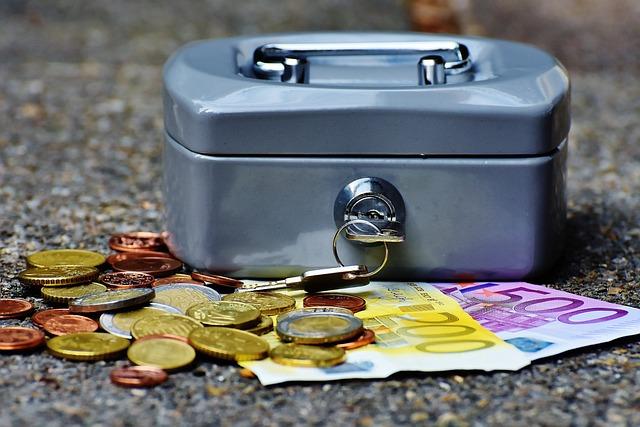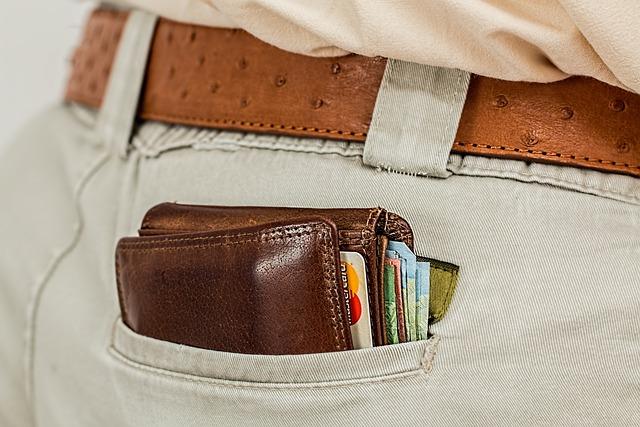Starting your journey into the world of finance can feel like trying to read a foreign language-confusing,overwhelming,and maybe a little intimidating. But don’t worry! Managing your money doesn’t have to be complex or stressful. Whether you’re fresh out of school, just landed your first job, or simply want to get a better handle on your cash, this finance 101 guide is hear to help. We’ll break down easy, practical tips that anyone can follow to take control of their finances and start building a smarter, more secure future. Ready to make money management less scary and way more doable? Let’s dive in!
Understanding Your Income and Expenses Like a Pro
Getting a solid grasp on your financial inflows and outflows is the foundation of smart money management. Start by tracking every source of income, whether it’s your paycheck, freelance gigs, or even those occasional cash gifts.Next, break down your expenses into clear categories-fixed costs like rent and utilities, and variable costs like entertainment or dining out. This practice doesn’t just reveal where your money goes but also highlights opportunities to tweak your spending habits for better savings. Pro tip: Use apps or simple spreadsheets to make this process painless and visually clear.
- Income sources: Salary, side hustles, passive earnings
- Fixed expenses: Rent, subscriptions, insurance
- Variable expenses: Groceries, gas, hobbies
To make sense of your monthly cash flow, here’s a speedy table to illustrate an ideal budget breakdown.Keeping your spending balanced ensures you’re charging towards your financial goals without feeling deprived:
| Category | % of Income |
|---|---|
| Essentials (Rent, bills) | 50% |
| Wants (Eating out, entertainment) | 30% |
| Savings & Debt | 20% |

smart budgeting Tricks That Actually Work
When it comes to managing your cash without feeling deprived, the secret lies in being strategically flexible. Instead of a strict “no-fun” budget, try the 50/30/20 rule: allocate 50% of your income for essentials like rent and groceries, 30% for both fun and lifestyle choices, and 20% straight into savings or debt repayment. This way, you keep your finances balanced while still treating yourself occasionally-no guilt necessary! Plus, keeping a simple spreadsheet or using budgeting apps can help you visually track every dollar, turning those numbers into a roadmap instead of a maze.
Here’s a quick rundown of savvy moves that can seriously boost your money game:
- Automate savings: Set up automatic transfers to your savings account the day you get paid.
- Use the cash envelope system: Allocate cash for variable expenses to avoid overspending.
- shop with a list: Whether it’s groceries or clothes, a list keeps impulse buys in check.
- Review subscriptions: Cancel unused memberships and downgrade plans where possible.
| Category | Monthly Amount | Tip |
|---|---|---|
| Rent & Utilities | $800 | Negotiate or look for cheaper options |
| Groceries | $250 | Buy seasonal and in bulk |
| Entertainment | $150 | Cut free local events |
| Savings | $300 | Automate transfers post-payday |

How to Build an emergency Fund Without Feeling Broke
Building an emergency fund doesn’t mean sacrificing all your fun or living on instant noodles forever. The trick is to start small and stay consistent. Even setting aside just $10 or $20 a week adds up over time without draining your wallet. Try automating your savings-have a portion of your paycheck or income transferred automatically to a separate account. This way, you won’t even miss the cash, and your fund grows quietly in the background. Another cool hack? Look for little daily expenses where you can cut back-like brewing your coffee at home rather of buying it out or canceling unused subscriptions-and funnel that extra money into your fund.
To make it even easier,consider this quick savings “cheat sheet” that keeps your budget balanced without feeling the pinch:
| Tip | Example | What You Save |
|---|---|---|
| Skip One Takeout | Cook at Home | $8-$12 per meal |
| Downgrade Streaming | Basic Plan | $5-$10 per month |
| Use Public Transport | Instead of Ride-share | $3-$7 per trip |
Remember,the goal is progress,not perfection. by making simple swaps and gradually boosting your savings, you’ll build a financial cushion without the feeling of being broke. Before you know it, your emergency fund will be a safety net – not a source of stress.
Simple Ways to Start Saving and Investing Today
Getting started with saving and investing doesn’t have to be overwhelming.Begin by setting aside a small, fixed amount of money each month-even as little as $20 can make a difference when you’re consistent. Open a high-yield savings account to grow your emergency fund, and gradually explore low-cost investment options like index funds or ETFs. Remember, the goal is to build good habits, so automate your transfers and let your money work for you without much of your daily attention.
Here are some easy strategies to kick things off:
- Track your spending: Know where your money goes before deciding what to save.
- Start an emergency fund: Aim for at least 3 months of expenses saved.
- Take advantage of employer plans: If your job offers a 401(k) match,contribute enough to get the full benefit.
- Invest what you can: use apps with no minimum investments to build your portfolio little by little.
| Saving Tip | why It Works |
|---|---|
| Automate Transfers | Removes the temptation to spend your savings |
| Start with Small Investments | builds confidence without huge risk |
| Use Round-Up Apps | Invest spare change effortlessly over time |
Avoiding Common Money Mistakes Every Newbie should Know
One of the fastest ways to drain your wallet is falling into impulse spending. It’s easy to get caught up in the excitement of new gadgets, trendy clothes, or those “limited time” sales. The trick? Always pause and ask yourself if that purchase adds real value to your life or if it’s just a fleeting desire. Sticking to a budget doesn’t mean living poorly; it means spending smarter. Keep a list of essentials and budget-pleasant alternatives to help you resist those tempting but unnecessary expenses. Remember, small leaks sink big ships!
Another rookie blunder is neglecting to build an emergency fund. Life happens – car troubles, medical bills, or unexpected rent increases - and without a financial cushion, these surprises can lead straight to debt. Aim to stash away at least three months’ worth of expenses. Here’s a simple breakdown of what that might look like:
| Monthly Expense | Amount ($) |
|---|---|
| Rent | 800 |
| Groceries | 250 |
| utilities | 150 |
| Transport | 100 |
| Total | 1,300 |
| Emergency Fund Target (3 months) | 3,900 |
Building this cushion might take time, but even setting aside small amounts regularly beats being caught off guard. As a bonus, this habit also teaches discipline and prioritization, two essentials for mastering money management early on.
Q&A
Finance 101: Easy Tips for Newbies to Manage Money Right – Q&A
Q: I’m totally new to managing money. Where do I even start?
A: Great question! Start by tracking your income and expenses.Knowing where your money comes from and where it goes is the foundation. Use a simple app, a spreadsheet, or even a notebook-whatever feels easiest.Just getting clear on this is a huge first step.
Q: How much should I be saving each month?
A: Aim for at least 20% of your income, but if that feels impossible, start smaller. Even saving 5% is better than nothing. The key is to be consistent and grow your savings habit over time.Q: Credit cards confuse me. Should I avoid them?
A: Don’t be afraid of credit cards-they can be helpful if used right. The trick is to pay off your balance in full every month to avoid interest. Use them for things you’d buy anyway, and treat them like a debit card.
Q: What’s an emergency fund and do I really need one?
A: Yes, you do! An emergency fund is cash saved for unexpected stuff like car repairs or medical bills. Aim for 3-6 months of living expenses. It gives you peace of mind and keeps you from going into debt when life throws a curveball.
Q: How can I avoid spending too much? I always blow my budget mid-month!
A: Try breaking your budget into smaller chunks-like a weekly allowance. Also, knowing your triggers helps. If you shop online when bored, maybe keep yourself busy with a hobby rather. Small habits add up.
Q: Should I invest or just save money in a bank?
A: Savings accounts are great for emergencies, but they don’t grow much. Investing can help your money grow over time but requires a bit of learning and risk tolerance. Start simple-maybe a low-cost index fund-and educate yourself gradually.
Q: Any quick wins for cutting expenses without feeling deprived?
A: Totally! Simple stuff like brewing coffee at home, canceling subscriptions you don’t use, cooking instead of ordering out, or switching to a cheaper phone plan can save you cash without major sacrifices.
Q: What’s the smartest way to pay off debt?
A: Two popular methods: the “avalanche” (tackling the highest interest debt first) and the ”snowball” (paying off the smallest debts first for motivation).Pick the one that keeps you motivated to stay on track!
Q: Where can I learn more without getting overwhelmed?
A: Check out beginner-friendly blogs,YouTube channels,or podcasts about personal finance. Start with bite-sized content and keep it fun. Finance doesn’t have to be scary or boring!
Managing money doesn’t have to be rocket science. Start small, stay consistent, and watch your financial confidence grow! Got more questions? Drop them below, and let’s chat!
Future Outlook
And there you have it-some simple, no-stress tips to get your money game on point! Remember, managing your finances doesn’t have to be complicated or overwhelming. Start small, stay consistent, and watch how these easy habits can make a big difference over time. Whether you’re saving, budgeting, or just trying to avoid those sneaky expenses, you’ve got this! Here’s to taking control of your cash and building a brighter financial future-one step at a time. Happy budgeting!











